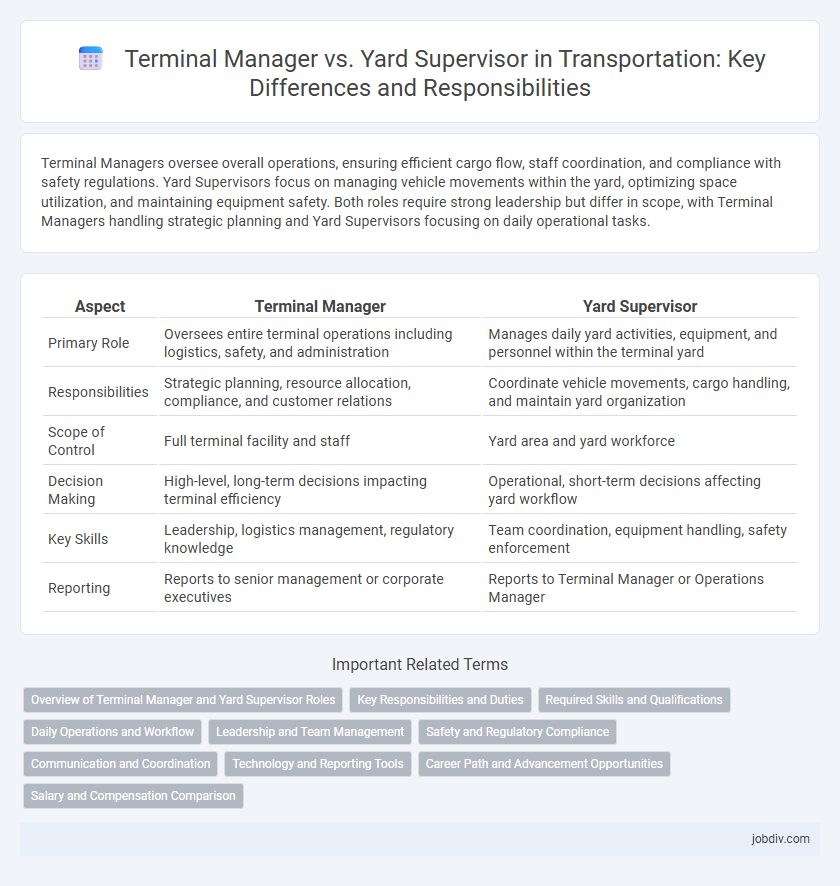Terminal Managers oversee overall operations, ensuring efficient cargo flow, staff coordination, and compliance with safety regulations. Yard Supervisors focus on managing vehicle movements within the yard, optimizing space utilization, and maintaining equipment safety. Both roles require strong leadership but differ in scope, with Terminal Managers handling strategic planning and Yard Supervisors focusing on daily operational tasks.
Table of Comparison
| Aspect | Terminal Manager | Yard Supervisor |
|---|---|---|
| Primary Role | Oversees entire terminal operations including logistics, safety, and administration | Manages daily yard activities, equipment, and personnel within the terminal yard |
| Responsibilities | Strategic planning, resource allocation, compliance, and customer relations | Coordinate vehicle movements, cargo handling, and maintain yard organization |
| Scope of Control | Full terminal facility and staff | Yard area and yard workforce |
| Decision Making | High-level, long-term decisions impacting terminal efficiency | Operational, short-term decisions affecting yard workflow |
| Key Skills | Leadership, logistics management, regulatory knowledge | Team coordination, equipment handling, safety enforcement |
| Reporting | Reports to senior management or corporate executives | Reports to Terminal Manager or Operations Manager |
Overview of Terminal Manager and Yard Supervisor Roles
Terminal Managers oversee the entire operations of transportation terminals, coordinating logistics, managing staff, and ensuring compliance with safety regulations to optimize workflow and customer satisfaction. Yard Supervisors handle the day-to-day activities within the yard, including directing vehicle movements, monitoring loading and unloading processes, and maintaining equipment and yard safety standards. Both roles are critical for efficient terminal management but focus on different levels of operational control and responsibility.
Key Responsibilities and Duties
Terminal Managers oversee overall terminal operations, ensuring efficient coordination of inbound and outbound shipments, staff management, and compliance with safety regulations. Yard Supervisors focus on managing yard activities, including vehicle staging, equipment allocation, and real-time tracking of trailer movements to optimize flow and reduce delays. Both roles emphasize logistical efficiency but differ in scope, with Terminal Managers handling strategic planning and Yard Supervisors concentrating on operational execution within the yard.
Required Skills and Qualifications
Terminal Managers require advanced leadership skills, comprehensive knowledge of logistics and supply chain management, and proficiency in regulatory compliance and safety standards. Yard Supervisors need strong organizational abilities, expertise in vehicle and equipment coordination, and experience with inventory control and real-time tracking systems. Both roles demand excellent communication skills and problem-solving capabilities to ensure efficient terminal and yard operations.
Daily Operations and Workflow
Terminal Managers oversee daily operations by coordinating inbound and outbound shipments, optimizing resource allocation, and ensuring compliance with safety regulations to maintain efficient terminal workflows. Yard Supervisors focus on managing vehicle movements, organizing trailer placements, and supervising yard staff to streamline loading and unloading processes. Their collaborative efforts enhance operational efficiency, reduce delays, and improve overall terminal productivity.
Leadership and Team Management
Terminal Managers oversee overall operations, ensuring strategic leadership and efficient resource allocation across the facility, while Yard Supervisors focus on direct team management and daily task coordination within the yard. Effective leadership by Terminal Managers involves setting performance goals and aligning teams with organizational objectives, whereas Yard Supervisors excel in hands-on supervision, resolving immediate operational challenges and maintaining workflow continuity. Both roles require strong communication skills and the ability to motivate teams, but Terminal Managers typically handle broader workforce planning and regulatory compliance issues.
Safety and Regulatory Compliance
Terminal Managers oversee overall safety protocols and ensure regulatory compliance within the entire transportation terminal, implementing comprehensive safety programs aligned with OSHA and DOT standards. Yard Supervisors focus on monitoring daily yard operations, enforcing safety measures such as proper vehicle movement and hazardous material handling, and ensuring adherence to site-specific regulations. Both roles require thorough knowledge of Federal Motor Carrier Safety Regulations (FMCSR) and play critical parts in maintaining workplace safety and minimizing regulatory violations.
Communication and Coordination
Terminal Managers oversee overall communication channels to ensure seamless coordination between inbound and outbound shipments, while Yard Supervisors focus on direct communication with ground staff to optimize vehicle movements within the yard. Effective coordination by Terminal Managers involves strategic planning and liaising with external carriers and clients, whereas Yard Supervisors manage real-time adjustments and task delegation to dock workers and drivers. Both roles require strong communication skills to maintain operational flow, but Terminal Managers emphasize broader logistical integration and Yard Supervisors prioritize hands-on yard activity management.
Technology and Reporting Tools
Terminal Managers leverage advanced transportation management systems (TMS) and integrated reporting dashboards to optimize terminal operations, track performance metrics, and streamline logistics workflows. Yard Supervisors employ real-time yard management software and RFID technology to monitor vehicle movements, manage asset utilization, and generate detailed shift reports for operational efficiency. Both roles utilize data analytics platforms to enhance decision-making, but Terminal Managers focus on strategic reporting while Yard Supervisors emphasize real-time operational insights.
Career Path and Advancement Opportunities
Terminal Managers typically oversee entire terminal operations, positioning them for advancement into executive roles such as Operations Director or Logistics Manager. Yard Supervisors concentrate on managing daily yard activities and staff, which serves as a foundational role leading to Terminal Manager positions. Career progression often involves gaining experience in logistics, team leadership, and operational strategy within transportation hubs.
Salary and Compensation Comparison
Terminal Managers typically earn higher salaries than Yard Supervisors due to their broader responsibilities overseeing entire terminal operations. Average annual compensation for Terminal Managers ranges from $70,000 to $110,000, while Yard Supervisors usually receive between $50,000 and $75,000. Benefits packages for both roles may include health insurance, retirement plans, and performance bonuses, with Terminal Managers often qualifying for higher incentive pay.
Terminal Manager vs Yard Supervisor Infographic

 jobdiv.com
jobdiv.com